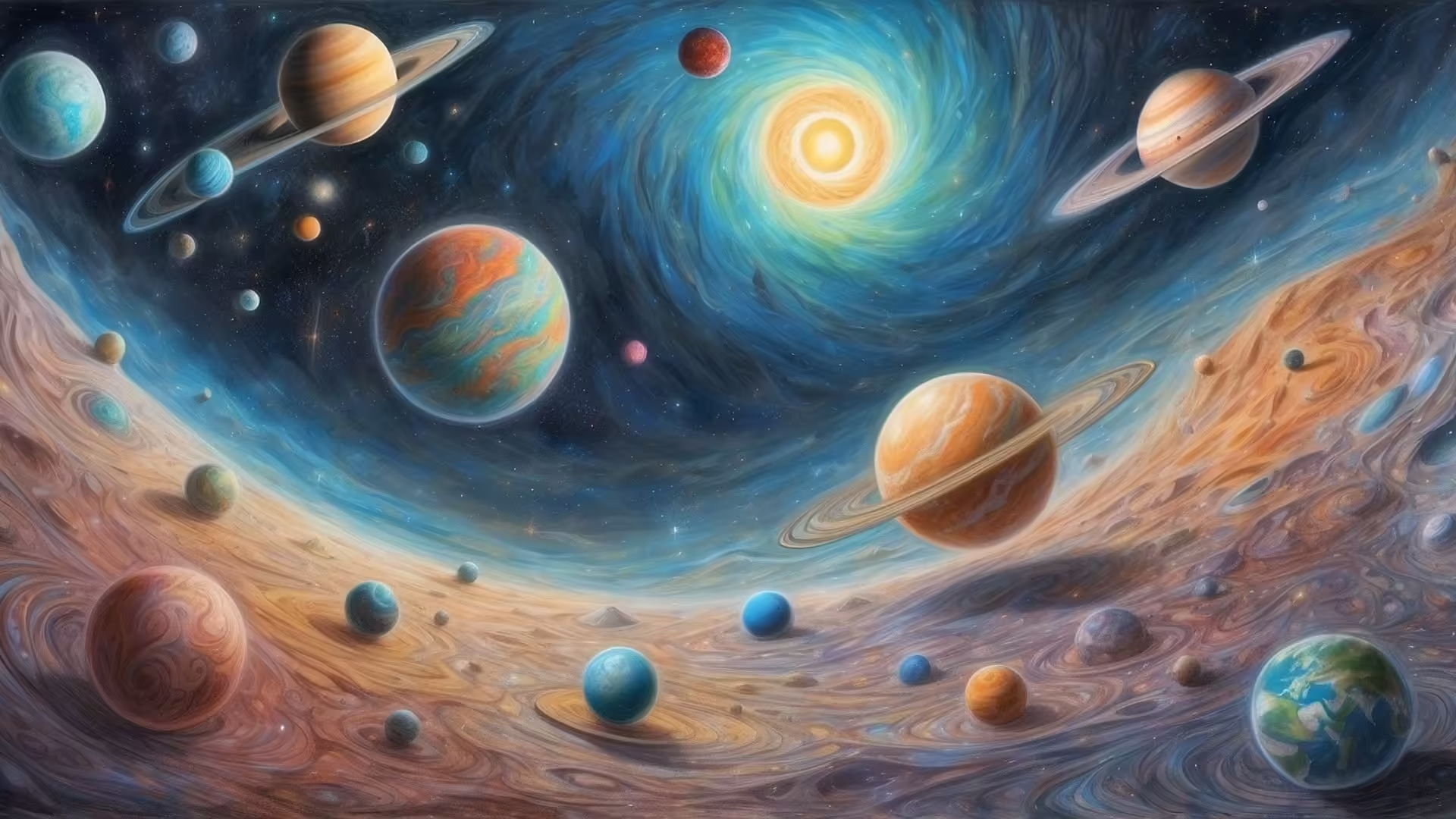- The Gist
- What Is the Multiverse?
- The Scientific Foundations of the Multiverse Theory
- Types of Multiverses: Different Possibilities
- Evidence (or Lack Thereof) for the Multiverse
- Multiverse in Popular Culture
- Philosophical Implications of the Multiverse
- What If the Multiverse Exists?
- Let’s Talk
- Let’s Learn Vocabulary in Context
The Gist
What Is the Multiverse?
The term “multiverse” refers to the idea that our universe is just one among many possible universes. These parallel universes might exist in a variety of forms—some nearly identical to ours, and others that operate under completely different laws of physics. The concept challenges the conventional understanding that the universe we see is the only one in existence.
The Scientific Foundations of the Multiverse Theory
- Quantum Mechanics: At the smallest scales, particles behave unpredictably, existing in multiple states simultaneously. The “many-worlds interpretation” of quantum mechanics suggests that every possible outcome of a quantum event happens in its own distinct universe.
- Cosmology: Some cosmologists believe that the rapid expansion of space during the Big Bang might have created “bubbles” of universes, each with its own distinct physical properties. This is known as the inflationary multiverse theory.
Types of Multiverses: Different Possibilities
- Parallel Universes: These are universes that exist alongside our own, possibly containing versions of ourselves living alternate lives.
- Daughter Universes: In this interpretation, new universes split off each time a quantum event occurs, creating an ever-branching tree of realities.
- Mathematical Universes: Some theorists propose that all mathematically possible worlds actually exist, meaning our universe is just one realization of countless mathematical structures.
Evidence (or Lack Thereof) for the Multiverse
Currently, the existence of a multiverse is purely theoretical. While some scientific models imply the possibility of multiple universes, direct evidence remains elusive. Observations of cosmic microwave background radiation—remnants from the Big Bang—have fueled speculation, but they aren’t definitive proof of other universes. Additionally, since alternate universes are, by nature, outside our observable reach, proving their existence poses a significant challenge.
Multiverse in Popular Culture
The idea of parallel universes has been a recurring theme in science fiction, influencing books, movies, and television shows. From the Marvel Cinematic Universe’s exploration of alternate dimensions to the thought-provoking ideas presented in The Man in the High Castle, the multiverse has become a storytelling device that sparks our imagination about “what if” scenarios.
Philosophical Implications of the Multiverse
The concept of multiple realities raises deep philosophical questions. If there are infinite versions of you living out every possible outcome, does personal responsibility lose its meaning? If every possible decision is played out in another universe, what does it say about free will and choice? Philosophers and scientists continue to debate these ideas, blurring the lines between science, philosophy, and metaphysics.
What If the Multiverse Exists?
While the multiverse remains an exciting but speculative theory, its allure lies in the possibilities it offers. If we live in just one of many universes, the implications for science, philosophy, and even personal identity are profound. For now, the multiverse is a concept that stretches the limits of human understanding and imagination. Who knows? Maybe somewhere out there, another version of you is reading this article right now.
Let’s Talk
So, let’s dig a little deeper into the whole multiverse thing, shall we? I mean, the idea of multiple versions of ourselves running around in parallel universes is both mind-blowing and… well, kind of terrifying, right? Imagine: somewhere out there, another you might have decided to become a rockstar, or maybe they said yes to a date you turned down. What would your life look like if you had made even one different choice along the way? Does that thought give you a weird feeling in the pit of your stomach, or is it just me?
Now, here’s the thing. The idea of the multiverse isn’t just for sci-fi movies. Sure, Marvel makes it fun with alternate timelines and different versions of Spider-Man, but some scientists actually believe in this stuff. And while they haven’t exactly built a machine to hop between dimensions (yet), quantum mechanics makes it clear that the tiniest particles behave in ways that don’t always make sense to us. Could that mean multiple realities exist, just slightly out of reach? And if so, what does that mean for us in practical terms?
It makes me wonder about decision-making in life. If every possible outcome plays out somewhere in the multiverse, does that mean our choices don’t matter? But here’s a twist: what if knowing that every version of us exists somewhere actually makes this version—the one you’re living right now—the most special one? Because you’re here, experiencing it firsthand. You’re not just a spectator in some alternate timeline; you’re living this moment, and that’s pretty amazing when you think about it.
There’s also something oddly comforting about the idea of a multiverse. Ever have one of those moments where you think, What if I had done things differently? Maybe you regret a missed opportunity or wish you could change the past. But hey, if the multiverse exists, then somewhere, another you is living that alternative path. It’s like a cosmic “What if?” game that takes the pressure off. No need for regrets—every version of you is out there, doing their thing. It makes you wonder, though, how much of our identity is tied to the choices we make versus the ones we don’t make. Are we defined by our decisions, or by the possibilities we leave behind?
Here’s where it gets a bit philosophical. If there really are endless versions of you, does it change the way you approach life? Would you take more risks, knowing that another version of you is playing it safe? Or would you stay the course, figuring that somewhere, one of those alternate yous is out there testing the waters? It’s an interesting thought, especially when it comes to the everyday stuff—like choosing a career, falling in love, or even deciding what to have for dinner. Maybe knowing there are endless possibilities makes the little things seem less stressful. Or maybe it makes every decision feel more significant.
And let’s not forget: the multiverse concept is also about embracing uncertainty. We like to think of life as linear, with a clear cause-and-effect path. But what if it’s messier than that? What if life is more like a web, with branches splitting off in every direction? Maybe the point isn’t to get everything right, but to make the most of the path you’re on. It’s like when you’re watching one of those “choose your own adventure” shows on Netflix. There’s no “right” ending—just the one you pick, and that’s what makes it worth watching.
At the end of the day, whether the multiverse exists or not, it challenges us to think differently about the way we live. It’s a reminder that every decision, every moment, and every experience matters—not because it’s the only version that could exist, but because it’s your version. So why not lean into it? Embrace the uncertainty, take a few risks, and enjoy the ride. Because who knows—maybe, somewhere out there, another version of you is cheering you on. And wouldn’t that be cool?
Let’s Learn Vocabulary in Context
Let’s break down some of the key words and phrases from our multiverse discussion because, honestly, half the fun of diving into these topics is learning how to talk about them like a pro. One of the terms that popped up was quantum mechanics. Sounds fancy, right? But it’s just a branch of physics that deals with the teeny-tiny building blocks of everything around us—particles that behave in ways we can’t always predict. You might have heard someone joke about something being “quantum” to make it sound complex, but in this context, quantum mechanics is all about the strange way particles can be in multiple states at once. Imagine trying to decide between two desserts and somehow eating both simultaneously—now that’s quantum behavior! In everyday conversations, you could say, “Life feels like quantum mechanics—every choice leads to infinite possibilities.”
Another cool term is many-worlds interpretation. This isn’t just a sci-fi idea; it’s a real theory suggesting that every possible outcome to every decision exists in a parallel universe. Think of it like those “Choose Your Own Adventure” books where each choice leads to a different story path. You can use it to sound philosophical about life’s twists and turns: “Hey, if the many-worlds interpretation is real, maybe in some other universe, I didn’t trip and embarrass myself at that wedding.”
Now, we threw around cosmology quite a bit too. It’s the study of the origins and structure of the universe—so, you know, light reading for a rainy afternoon. When you think about cosmology, it’s kind of like looking at the universe’s family photo album. We’ve got theories about how it all began, like the inflationary theory, which suggests the universe expanded super-fast right after the Big Bang. In real life, you could say, “My to-do list feels like inflationary theory—it just keeps expanding faster than I can handle!”
Let’s not forget the idea of a parallel universe, which is one of those things we love to think about when life gets a bit boring. The thought of another you, living a totally different life, can make you question everything. It’s fun to play around with: “In a parallel universe, I probably became a concert pianist… or a professional napper.” It’s not just a cool concept—it can also remind us that our choices shape who we are, even when things don’t go exactly as planned.
We also mentioned cosmic microwave background, which might sound like the signal your microwave sends out when it’s done cooking your popcorn. In reality, it’s faint radiation leftover from the Big Bang, giving scientists clues about the universe’s early days. You could totally use this term in a conversation to sound smart: “I feel like my brain has some kind of cosmic microwave background—leftover thoughts from ideas I had years ago!”
And here’s a big one: free will. This is the idea that we have the ability to make our own choices and shape our destiny. But if every decision plays out somewhere in the multiverse, does that change how we think about free will? It’s a deep concept, but it’s something we wrestle with every day—whether we’re choosing a career or deciding between ordering pizza or sushi. You might find yourself asking, “If every choice plays out in some other reality, does it really matter which one I pick?”
So now that we’ve got some of these key terms down, let’s turn it over to you. If the many-worlds interpretation were real, what’s one version of your life you’d be curious to explore? And if you knew that every decision creates a new reality, would it change the way you approach making choices? Or would you still go with your gut, knowing that somewhere out there, another version of you is trying something different?










0 Comments